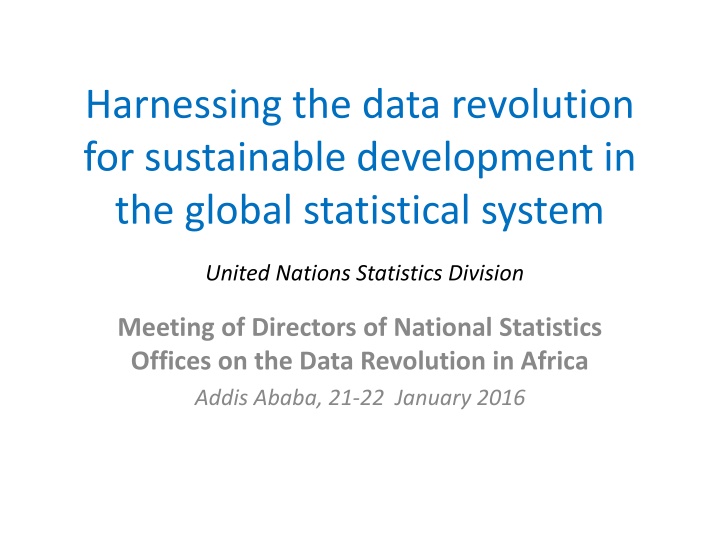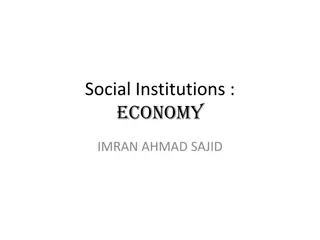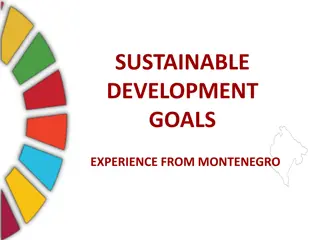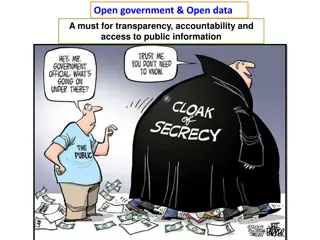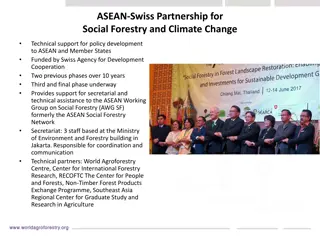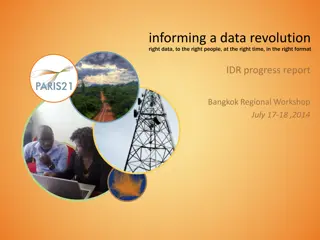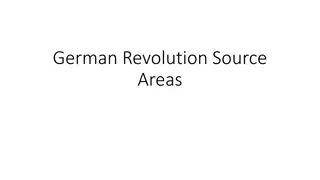Embracing the Data Revolution for Sustainable Development
Embracing the data revolution is crucial for sustainable development. The United Nations Statistics Division emphasizes the importance of quality, accessible, timely, and reliable data for measuring progress and leaving no one behind. The 2030 Agenda for Sustainable Development sets out a follow-up and review framework at global, regional, and national levels to monitor the implementation of the Sustainable Development Goals. Strengthening statistical capacities, developing global indicator frameworks, and using data at all levels are key priorities highlighted in the agenda.
Download Presentation

Please find below an Image/Link to download the presentation.
The content on the website is provided AS IS for your information and personal use only. It may not be sold, licensed, or shared on other websites without obtaining consent from the author.If you encounter any issues during the download, it is possible that the publisher has removed the file from their server.
You are allowed to download the files provided on this website for personal or commercial use, subject to the condition that they are used lawfully. All files are the property of their respective owners.
The content on the website is provided AS IS for your information and personal use only. It may not be sold, licensed, or shared on other websites without obtaining consent from the author.
E N D
Presentation Transcript
Harnessing the data revolution for sustainable development in the global statistical system United Nations Statistics Division Meeting of Directors of National Statistics Offices on the Data Revolution in Africa Addis Ababa, 21-22 January 2016
2030 Agenda for sustainable development: Follow-up and review framework The High-level Political Forum (HLPF) will have a central role in overseeing a network of follow-up and review processes at the global level, working coherently with the General Assembly, ECOSOC and other relevant organs and forums, in accordance with existing mandates
2030 Agenda for sustainable development: Follow-up and review framework Global level Annual progress report on SDGs by the SG in cooperation with the United Nations system, based on the global indicator framework Regional level Follow-up and review at the regional and sub-regional levels will provide useful opportunities for peer learning, sharing of best practices and discussion on shared targets. National level Member States to conduct regular and inclusive reviews of progress at the national and sub-national levels which are country-led and country- driven
2030 Agenda for sustainable development: Main outcomes concerning statistics Recognition at the highest political level of the key role of quality, accessible, timely and reliable disaggregated data to measure progress and ensure no one is left behind Request to use data and information from existing reporting mechanisms Commitment to strengthen statistical capacities in developing countries, particularly African countries, LDCs, LLDCs, SIDS and middle-income countries Statistical Commission / IAEG-SDGs mandate to develop by March 2016 the global indicator framework to be adopted by ECOSOC and GA
SDG indicator framework Global indicators will be the core of all other sets of indicators Member States may develop additional indicators for regional, national and sub-national levels Thematic indicators are also being developed in a number of areas
Mandates of the IAEG-SDGs and HLG Inter-agency and Expert Group of SDG indicators (IAEG-SDGs) To develop a global indicator framework for the goals and targets of 2030 Agenda, and to support its technical implementation High-level Group for Partnership, Coordination and Capacity-Building for post-2015 monitoring To promote national ownership of the post-2015 monitoring system To foster statistical capacity building, partnership and coordination
Specific tasks of the High-level group related to the Data Revolution Develop a global action plan for statistics to address the challenges of the data revolution for sustainable development and the transformative agenda for official statistics Formulate strategies to address data gaps and strengthen national statistical capacities Make recommendations to ensure coherence of data at the national, regional, and global levels Promote an institutional framework that enables stakeholder groups to contribute with their experience and resources at the national, regional and global levels, without undermining the central role of National Statistical Systems Lead the organization of a UN World Data Forum
Next steps in the work programme of the High-level group Develop an outline for a global action plan for data Identify strategic principles to address gaps in data availability for SDG indicators Discuss country experiences and lessons learnt in national, regional and global data reporting Reach out to key potential partners Finalize a concept note of the UN World Data Forum (to be presented at the 47th session of the Statistical Commission)
